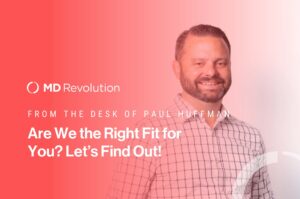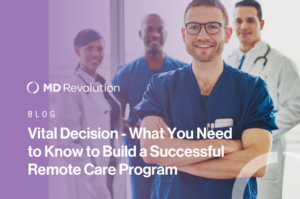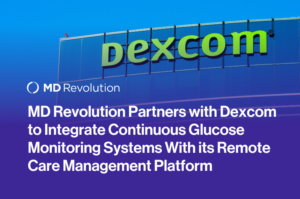Over the last few decades, healthcare research and technology have made great strides. With these advances, come the benefits of highly specialized and personalized medicine. Today, there are an increasing number of specialty practices that cater to all types of health concerns—from cardiology and pulmonology to urology.
As the industry continues to evolve, specialty practices such as cardiology face the challenge of differentiating themselves in an increasingly competitive landscape. With heart disease the number-one killer among men and women in the United States, it’s understandable why—out of necessity—the cardiology market is so saturated.
To stand out, cardiology practices must prioritize patient engagement and satisfaction, integrate the latest technology, and develop specialized programs that meet the unique needs of their patient base. In order to do so, it’s imperative to understand the most pressing challenges cardiology practices are facing in a crowded specialty practice marketplace.
What Are the Most Pressing Problems Facing Cardiology Practices?
Running a cardiology practice is a complex undertaking. The following represent some of the primary issues cardiology specialists encounter.
1) Patient Engagement and Satisfaction
One of the most significant concerns among cardiology practice leadership is patient engagement and satisfaction. Neither can exist without the other. If a patient isn’t engaged, the likelihood of satisfaction diminishes. If a patient isn’t satisfied at the outset of their encounters with the cardiology practice, there’s a much greater chance they’ll remain unengaged throughout their care journey and with their care plan.
In the long term, low patient satisfaction impacts practices in myriad ways. When individuals are engaged and content with their care, they will remain loyal patients, share positive recommendations for word-of-mouth referrals, and adhere to their care plans – which directly impacts outcomes and lowering the overall cost of care.
2) Quality of Care
Even if patients are engaged, there are even greater opportunities to improve quality of care. In today’s market, care quality extends far beyond the practice’s staff and caregiving team. With new and emerging technologies, remote patient monitoring, early risk prediction and identification, and more, practices have the opportunity to bolster their quality of care – beyond the practice walls.
With the emergence of whole person care, value-based arrangements, and preventative care, establishing a high quality of care is more important than ever before. Practices today need to explore solutions that offer continuous monitoring and chronic care management solutions in order to proactively provide care – without assuming any additional burden or workload.
3) Reimbursements
One challenge that has stymied many specialty practices is how to maximize reimbursements. An accurate, streamlined, and automated revenue cycle can mean the difference between keeping the doors open or shuttering the practice. High rates of hospital readmissions, disparate care due to poor patient engagement, and lost patient opportunities via an overworked staff all diminish the potential for reimbursements.
Without maximizing revenue streams, practices run the risk of falling behind their peers. To stay ahead, specialty practices must embrace innovative new solutions that streamline reimbursements without any additional burden on busy practice staff. These new programs automatically collect patient visit codes and streamline billing to unlock new revenue streams and improve practice operations from the inside-out.
4) Provider Retention
In the era of “The Great Resignation,” business leaders in all industries are identifying ways in which they can improve retention. The same is true for specialty practices. Long hours due to excessive documentation and complex patient follow-through often sour the idea of working in a cardiology practice. It’s imperative for practice leaders to find ways to lessen the burden on their staff.
Technology that offers automation, ways to streamline workflows, and unlock efficiencies for operational administrative staff can make a humongous difference across the board. Not only will patient satisfaction, care quality, and reimbursements improve, but staff and caregiver retention will, as well.
Challenges Like These Deserve Solutions
Given all of the above, it may seem daunting to think about how to promote growth in your cardiology practice—particularly in the increasingly competitive market. Rest assured, that doesn’t have to be the case.
MD Revolution has focused on refining the most essential solutions to enhance the operational efficiency of all types of specialty practices. Specifically, the integration of remote patient monitoring (RPM) and chronic care management (CCM) has been a game-changing component. Through this dual
enrollment approach, we are assisting cardiology practices in overcoming the most challenging obstacles hindering their practices’ long-term growth.
RPM + CCM: A Clear Path to Cardiology Practice Success
It’s true, there will likely never be a solution that erases every single obstacle that cardiology practices face. Yet, there are options to significantly reduce barriers to practice success and growth.
By implementing RPM and CCM as a dual-enrollment program, cardiology practices have a clear advantage over competitors that don’t recognize this high value approach. In this way, you have the power to dictate the future of your practice.
Christine Onstott, AAS-N, BS, Director of Operations for Cardiac Solutions, a comprehensive care practice with three locations in Arizona’s West Valley area and 22 board-certified cardiologists, agrees: “[The RevUp solution] is affecting our patients’ health in a very positive way. They see us taking care of them with these additional and frequent touchpoints, while enabling us to have a handle on their wellbeing even when they’re not here seeing us physically. This is helping us provide our patients with high quality, concierge-like care. It’s something that no other cardiology practice provides.”
To learn more about the RevUp platform and how it’s helping specialty practices transform their operations for the better, please get in touch with us or request a demo. And, stay tuned for the second iteration of this topic where we explore the “Top 7 Benefits of Addressing Cardiology Practice Challenges Head On.”
**Access Christine Onstott’s full interview here.



